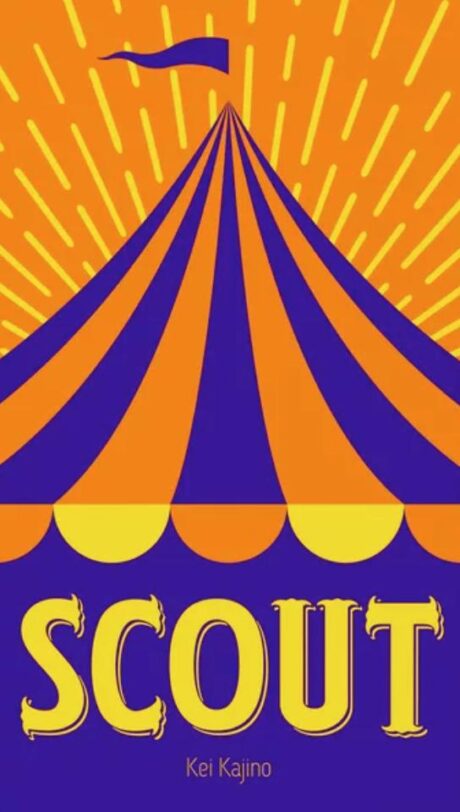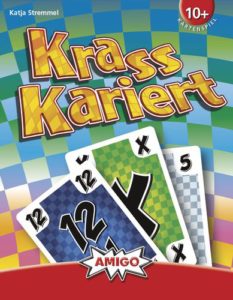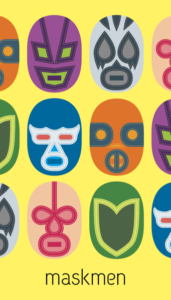- Learning time
- 10 minutes
- First play time
- 40 minutes
SCOUT
Designed by: Kei Kajino
Scout is a simple climbing game with one rather large catch: you can only play cards that sit adjacent in your hand as it was dealt, and you cannot move the cards around. The one thing you can do before play starts is flip your entire hand the other way up: each card has a different number, depending on its orientation.
It works like this. The starting player plays a single card, or set of cards. A set can be a run (at least two cards, but there’s no limit as long as they are in order: descending or ascending) or duplicates of the same number (-which is stronger than a run). Runs or sets in higher numbers beat lower numbers, so 7-8-9 can be beaten by three 1‘s, and three 1‘s can be beaten by three 2‘s and so on.
The next player has a choice. If they can (and want to) beat the previous card or cards, they play their own to the table and claim the previous player’s cards as points: 1 point per card. If they can’t (or choose not too) they can scout: taking a card from either end of the played set and adding into their hand in whatever position and orientation they like. The scouted player gets a point, and their set is now weakened: for instance, three 8‘s become two 8‘s. The scouting player can create or strengthen a set in their hand, making it easier to play next time. Once per round, you can scout and play on the same turn: timing this can be critical!
Each round continues until either someone plays their last hand cards to the table, or a set is played and every other player scouts in response. Everyone gets a point per claimed card and a point for each scout token they collected, and minuses a point for each card they still have in their hands. After a number rounds equal to the number of players, the most points wins!
The guru's verdict
-
Take That!
Take That!
Not much to speak of. You are outscoring each other, but there's no direct interaction or confrontation.
-
Fidget Factor!
Fidget Factor!
Pretty low - once you understand how Scout works, turns move reasonably fast... but there can be the occasional pause.
-
Brain Burn!
Brain Burn!
More tactical than strategic, Scout challenges you to adapt and manipulate your hand into a place where you can win more opponent cards, dump more of your own, and turn what looks like rubbish when it first arrives, into gold.
-
Again Again!
Again Again!
Speedy, accessible, puzzly enough to feel tricky but light enough not to overwhelm, Scout is a canny game that you cannot predict












Sam says
I really enjoy Scout. You do have to be okay with dumb luck pooping on your fire - it's possible to get a dud hand - but even the least co-ordinated hand does contain opportunities: to shed this card and combine its neighbours into a set, to scout for that card and turn your isolated 1 into a pair of 1's. If individual rounds can feel a bit like a lottery at time, the multiple rounds do somewhat balance things out - and the more you play, the more you see the opportunities buried in your hand: when to play, when to scout, and (once per round!) when to do both. It's really satisfying turning base metal into gold, and Scout gives you the opportunity. It's a gem; a canny evolution of the (also fun) Krass Kariert.